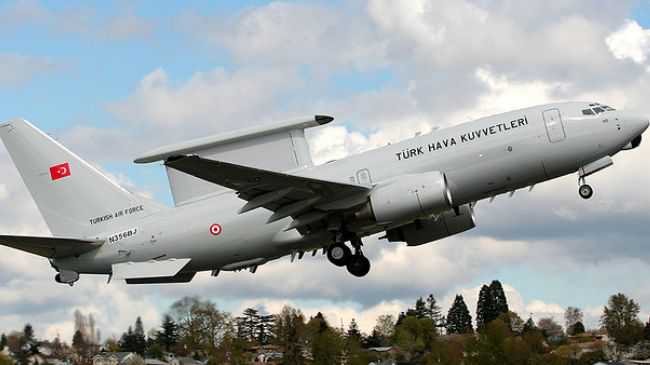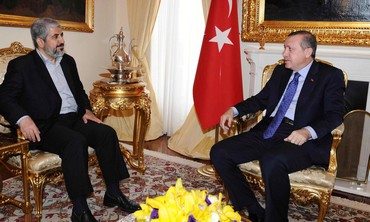Contrary to what common interests might otherwise suggest, the upheaval in Syria has not altered the Turkish government’s view of Israel. Turkish Prime Minister Erdogan’s recent assertion that Israel was operating like a “terrorist state” when it bombed targets outside Damascus last month indicates that Turkey is not seeking to incorporate Israel into its Syria strategy. Although Israel might wish otherwise, there is little reason to believe that Turkey will change its tune regarding bilateral relations in the near term, but there is prospect that relations may thaw in the longer term.
Erdogan stated that Turkey would only renew ties with Israel under three conditions — that Israel issue an official apology for the Mavi Marmara (Palestinian flotilla) incident in May 2010, provide financial compensation to the victims’ families, and lift the blockade on Gaza. It is highly unlikely that the Israeli government would meet the first two conditions; if it were inclined to do so, it would have already done so, and no Israeli government would support lifting the blockade on Gaza as long as it remains under Hamas’ administrative authority.
By linking a restoration of ties with Israel to a condition that Turkey knows Israel will not meet, one must conclude that Ankara is not inclined to mend fences with Israel and prefers an antagonistic relationship. Indeed, this is consistent with Erdogan’s ongoing ambition to be a hero to the Arab ‘man in the street,’ as well as the foreign policy objectives of the ruling Justice and Development Party (AKP).
Since the AKP’s rise in 2002, Ankara’s foreign policy decisions have become increasingly under the control of elected civilian leaders committed to catering to public opinion. While Erdogan’s opponents have criticized his administration’s handling of certain aspects of foreign affairs — especially vis-à-vis Syria — he has faced virtually no condemnation for severing ties with Israel. It seems only Turkish businesses active with Israel are concerned about the deterioration of bilateral relations. Given that bilateral trade has actually increased since diplomatic relations deteriorated, there is no reason for Erdogan to expect a backlash from the domestic business community. Moreover, Turkey’s conservative Islamists — the APK’s core constituency — are supportive of their government’s current policies vis-à-vis Israel. As Erdogan eyes continued rule, his position on Israel only shores up his base.
Turkey’s stance on Israel must also be analyzed within the context of Ankara’s pursuit of greater autonomy from Washington, and its interest in capitalizing on Turkey’s strategic depth throughout the Arab world. While remaining a U.S. ally under AKP rule, on numerous occasions Ankara has refused to march to Washington’s drum, opting instead for a more independent foreign policy, which has provided greater returns over the past last decade. Turkey has largely and successfully filled a vacuum created by America’s declining influence on the Arab Street.
Whereas the U.S. position on Israel/Palestine is widely resented throughout the Arab world, Ankara is advancing a position far more reflective of public opinion throughout the region. Erdogan’s calls for Israel to disband its nuclear arsenal, lift the blockade on Gaza and recognize a sovereign Palestinian state have been well received throughout the Arab world. Due largely to this, Erdogan is arguably the most popular leader in the Middle East and North Africa (MENA). With the world’s 17th largest economy and a deep historical connection to the inhabitants of the former Ottoman Empire, Turkey is well poised to expand its soft-power influence throughout MENA. More likely than not, the benefits of maintaining the poor bilateral relations with Israel will continue to outweigh the benefits of restoring ties.
Given the ‘Islamic winter’ that is developing as an outcome of the Arab Awakening, and its growing isolation, Israel would clearly welcome improved ties with Turkey. Israel’s isolation is evident beyond its immediate borders, as was noted by many of Israel’s traditional European allies voting in favor of non-member observer state status for Palestine at the UN last year and the entire Non-Aligned Movement voting unanimously in favor of Iran’s right to pursue nuclear energy in Tehran last August.
As Turkey and Iran compete for expanded soft-power influence and control over energy corridors in the Middle East and Central Asia, Syria has become a focal point of their rivalry, however Ankara and Tehran’s mutual interests will likely prevent any conflicts of interests from creating a hostile bilateral relationship. That said, Turkey and Israel’s shared interest in reducing Iran influence’s in Syria is not a strong enough commonality to unite Turkey and Israel. Turkey would not want the replacement of President Assad and/or Iran’s weakened strategic posture vis-à-vis Syria to result either in diminished bilateral business interests in Iran, or stronger Israeli influence in the region.
While Turkey’s relationship with the Free Syrian Army indicates Ankara’s commitment to toppling the Ba’athist regime in Syria, Israel would view Assad’s ouster with much hesitation, despite its ambition to weaken the so-called “resistance axis” of Iran/Syria/Hezbollah. While no friend of Israel, the Assad regime has in the past stated its willingness to make peace with Israel, and a de facto peace has existed since the 1973 Arab-Israeli war, when the Assad regime regulated militant groups in Syria and afforded the Israelis with four decades of peace along their border. Israel recognizes that Salafi jihadists resent Assad’s willingness to hold peace talks with Israel and regulate factions that seek to confront the Jewish state. The rise of groups such as Jabhat al-Nusra in a post-Assad Syria would constitute grave security dilemmas for Israel.
The high level of animosity between Ankara and Jerusalem undermines prospects for any short-term reconciliation, and the evolving Arab Awakening does not appear to be a force likely to alter Turkey’s calculus — at least in its present form. As Washington is preoccupied with more pressing issues — such as winding down the Afghan war, Iran’s nuclear program, and the Syria conflict — facilitating a rapprochement between Turkey and Israel is not a high priority for the Obama Administration. Likewise, Turkey’s decision-makers are more likely to continue devoting their energy toward Syria and securing Turkey’s long-term commercial interests. Israel can be expected to maintain its focus on its growing security dilemmas along its borders, and its standoff with Iran over Tehran’s alleged nuclear ambitions, so restoring the health of bilateral relations is not a priority for either state.
That said, recent reports indicate that Turkey’s leaders intend to maintain a line of communication with Israel. During Operation Pillar of Defense in November last year, Turkey’s head of intelligence met with Mossad’s head in Cairo, and a senior Israeli envoy in Switzerland. It seems both governments realize what is at stake, and that neither can afford a complete cessation of communication. As the Arab Awakening continues to reveal unexpected and unwelcome surprises, and as Iran continues to barrel toward a full nuclear weapon capability, Ankara and Jerusalem are more likely than not to acknowledge that they have more to lose than to gain as a result of the continuation of a chilly relationship. Even though Mr. Erdogan clearly wishes to prolong his credibility with the ‘Arab Street’ as long as possible, with the stakes so high, and with Turkey wishing at the same time to maintain its ‘street cred’ with the West, the two states should eventually find a way to reach some common ground.
Daniel Wagner is CEO of Country Risk Solutions, a cross-border risk management consulting firm, and author of the book “Managing Country Risk”. Giorgio Cafiero is a research analyst with CRS.




